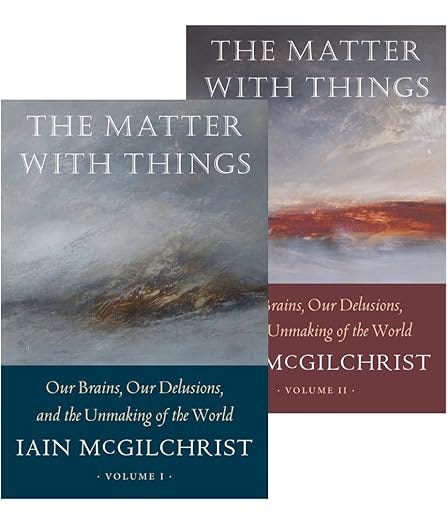Spengler.
Once, at a conference of scientists, I gave a speech that did not go well. I’ve probably blocked the memory to some degree because I can’t for the life of me recall what the speech was about. But the general idea was that science could no more escape the filter of consciousness than any other human endeavor. Mathematics is no less a human construct than language. It too must be tested against reality in order to give us, at best, the same sort of useful analogue of unknowable reality as more spiritual endeavors, like love and faith.
The reception was not hostile. Worse! It was polite. And when I returned home, I described the experience to you. “You didn’t show your work,” you said. I accepted that, but added grumpily, “I’m an artist. My whole job is not showing my work!”
This exchange came back to me last week when I had the delightful experience of interviewing Iain McGilchrist, the polymath philosopher whose magnum opus, The Matter with Things, I enjoyed so much. He was wonderful, and the interview will be released this Wednesday.
As I was writing a quick introduction to the interview, I was reflecting that a man like McGilchrist — a psychiatrist, neuroscientist and scholar — was so impressive in his rediscovery of the sacred precisely because he could show his work, could describe how he got where he was going. I said something like, “An artist like me can make the leap of faith without explanation because artists don’t really know why they know what they know. But a philosopher and scientist has to begin at the place where the history of philosophy and science has taken us and get to the sacred step by step.”
You can hear me ask him about this in the interview. His replies are excellent — succinct, humble and commonsensical. But they illustrate a problem of the present moment.
McGilchrist described how he had to meet thinkers where they are, that he had to begin with the nuts and bolts of brain science in order to get to the indescribable truths of faith. This explained to me why I have always predicted — what I believe is happening now — that the next revival would come from the intellectual class, not from the street.
But it also suggests that a very specific class of thinker may be difficult to reach. This is what we might call the Clever. These are the people who can think well enough, but only as long as they stay within the clerisy’s default of unbelief — precisely because they are the clerisy, the influencer class, or they desperately want to be.
But be not afraid. After Elon Musk’s A.I. Grok went Nazi last week, it’s easy to see how the devil may put our latest technology to use. But perhaps the angels can use it too, to create a revolutionary atmosphere in which the Clever have permission to change their minds.
Love, Dad





"Every age has its intelligentsia, and by the intelligentsia is here meant not the educated, but those who have been educated beyond their intelligence." Fulton Sheen
I think our age is suffering from an over-abundance of intelligentsia. The true intellectuals will look for the truth of things, but the middle managers will look for the "truth" that will let them keep their status of thinking they are better than the most of us.
_The Matter With Things_ is nearly 3,000 pages long, including notes. It has to be. McGilChrist starts at the very beginning, with the need for a being in the world to have different spheres of awareness, one discrete (I need to do this, then this, then this, in that order to pluck that tasty apple from the tree branch) and one indiscreet ("I need to be prepared for any threat coming from anywhere at any time").
According to Kindle, I am only 10% of the way into _The Matter With Things_ and already I am compelled to see what we call reality with new eyes.